
Wanted: a thick-skinned lawyer and consumer advocate willing to tackle the No. 2 job at a fledgling agency that consistently angers Republicans, powerful bankers and even some of its own employees.
That rough job description might characterize the Consumer Financial Protection Bureau's search for a permanent deputy director. The second-in-command to CFPB Director Richard Cordray is proving to be a tough job to fill, particularly in an election year.
While the position does not require Senate confirmation, a permanent deputy director could run the CFPB for a long time once Cordray's five-year term is over in mid-2018, especially if a political battle breaks out over Cordray's successor. Given the contentious fight over Cordray's recess appointment before he was ultimately confirmed by the Senate in July 2013, the agency may wait to name a permanent No. 2 until after the election, according to observers.
"Think about how hard that [political] dynamic is for a potential deputy director…it's not easy," said Raj Date, the managing director at the venture firm Fenway Summer, who is a former deputy director of the CFPB. "Running the CFPB is a stressful and all-consuming job, and a new deputy director is essentially signing up for an unlimited commitment, because who knows when or if the Senate would ever actually get around to doing its constitutional job on a director confirmation."
Lucy Morris, a partner at Hudson Cook and a former deputy enforcement director at the CFPB, agreed. "I think they're likely to keep things in the status quo until after the election when there will be a new administration," she said.
The absence of a permanent No. 2 comes at a time when the CFPB is going through another wave of departures of high-profile officials.
In the past few months the CFPB has lost Meredith Fuchs, its general counsel, who joined Capital One as a financial services regulatory counsel; Kathleen "Kitty" Ryan, the former deputy assistant director for the office of regulations, who joined the law firm BuckleySandler; Thomas Kearney, who led the team responsible for the Home Mortgage Disclosure Act rulemakings and joined the law firm Ackerman LP; Rohit Chopra, an assistant director and student loan ombudsman, who joined the U.S. Department of Education as senior adviser; and Michael Scherzer, a lawyer in the office of regulations, who joined Relman, Dane & Colfax.
Former CFPB officials said that the long work hours may cause high turnover at the agency. Private industry also has been a big lure regularly tapping senior officials.
The high rate of turnover has left some in the industry worrying about the CFPB's consistency and efficiency.
"When you have experienced people working on a particular regulation and they leave and have to get a replacement, it can have a practical impact of slowing down the rule-making process," said Alan Kaplinsky, who leads the consumer financial services group at Ballard Spahr.
There has been no permanent deputy director since July, when Steven Antonakes, the former Massachusetts banking commissioner, unexpectedly resigned as the No. 2 at the agency. The agency tapped Fuchs to serve as acting deputy director, but she left just five months later.
In January, the CFPB
Many said the election appears to be working against filling the No 2. spot permanently, at least for now. The agency is already under fire from congressional Republicans, but if the GOP wins back the White House, the agency will undoubtedly become even more of a target. Republicans are also trying to pass a bill that would restructure the agency, eliminating the single director and replacing it with a five-member board. If that legislation were to pass, the deputy director's role might be less of a draw.
"This close to an election, it may not be a terribly attractive position for someone looking to enter government," said Ben Olson, a partner at BuckleySander and former deputy assistant director for regulations at the CFPB. "And it takes time to fill a high-level position. I don't think the deputy job will be filled on a permanent basis until after the election. In the meantime, David Silberman is more than capable of holding the fort."
A CFPB spokesperson said the search for a permanent deputy director was continuing.
By taking more time, Cordray could also potentially recruit a broader set of candidates. The ideal applicant would have deep knowledge of the financial services industry, be adroit at policy analysis and have the leadership skills to execute a complicated consumer-focused strategy, albeit one that is constantly under the microscope.
"It's a hard search," Date said. "It's hard to get people in the prime of their careers to take on difficult jobs, at what is probably a pay cut, for an indefinite length of time."
Cordray may also not be in a rush to find a permanent replacement given that Silberman, who started working at the bureau in its inception in 2010, has institutional knowledge and is highly regarded.
Before joining the agency, Silberman spent 12 years at Kessler Financial, a Boston credit card marketing firm. He helped to create affinity credit cards for MBNA, the giant credit card issuer that Bank of America bought in 2005. He also created Union Privilege, an arm of the AFL-CIO that provided credit cards and other financial products to union members.





